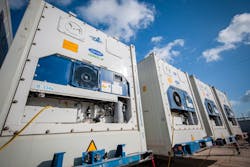USDA to help ease shipping delays at Texas, Washington ports
The U.S. Department of Agriculture (USDA) and Port of Houston are partnering to increase export capacity for chilled and frozen agricultural commodities in an effort to improve services for shippers of U.S.-grown products.
As part of the new partnership, USDA will lease additional trailer chassis units, which are used to position and store refrigerated shipping containers while they wait for vessels to arrive in the Gulf of Mexico, enabling the port to fully utilize its capacity and minimize restriction of exports due to delays, the department said.
In addition, USDA says it is expanding its existing partnership with the Northwest Seaport Alliance (NWSA) to enhance access to a 16-acre “pop-up” site to accept either dry agricultural or refrigerated containers for temporary storage at NWSA in Tacoma, Washington, to reduce operational hurdles and costs, so they can more quickly be loaded on ships at the export terminals.
“American farmers and ranchers depend on a reliable and efficient transportation system to move their products to market,” said Agriculture Secretary Tom Vilsack. “As part of the Biden-Harris administration’s creative approaches to improve port operation, we are collaborating with partners in the supply chain to adapt and overcome challenges facing agriculture. USDA is pleased to announce the partnership with the Port of Houston and the expanded collaboration with NWSA to further ease port congestion.
“Through these investments, we continue to deliver on our promise to bolster the supply chain and support American-grown food and fiber.”
Port of Houston
Foreign sales of U.S. poultry, beef, and pork through the Port of Houston totaled a half-billion dollars in 2021, but millions in sales are at risk due to limited availability of equipment, specifically chassis, at the port to move and position reefer containers while waiting for the vessels to arrive, USDA said. The American agriculture sector, particularly the meat industry, has expressed significant concern in response to these limitations, especially as challenges at West Coast ports have shifted some volume to the Gulf and eastern ports. These impacts reverberate across the supply chain, impacting not only exporters, but also producers in states throughout the South and Southwest.
Agricultural products in reefer containers typically are stored on chassis at the Port of Houston’s wheeled-container facilities. Unfortunately, chassis have been in short supply over the last two years, reducing the port’s capacity to handle chilled or frozen agricultural exports, USDA reported. While the port is preparing for a longer-term investment in a rack system, the lack of a dedicated pool of chassis at this time has forced it to “ground” reefers.
This decision, made out of necessity, adds inefficiency due to the extra time and steps involved in moving reefers off and on chassis before being put on the vessel. Additionally, the current electrical system of plugs is half as efficient with grounded containers as fewer plugs are accessible. At the same time, ongoing supply chain issues have made it difficult to pivot to short-term rentals of chassis.
Using Commodity Credit Corp. funds made available to address market disruptions in September 2021, the Agricultural Marketing Service (AMS) will cover 50% of the cost of obtaining and leasing chassis at the Port of Houston during the first year of its five-year lease of an additional 1,060 chassis. USDA funding will help manage the risk of the investment and ensure the port is able to fully utilize its current capacity for reefers and avoid the risk of turning away or delaying exports. This partnership will ensure agricultural companies and cooperatives are able to export their commodities through the port and avoid costly delays or capacity constraints.
Northwest Seaport Alliance
Congestion-induced impacts to vessel schedules and prioritization of returning containers empty to Asia have “significantly” raised barriers for exporting agricultural commodities in containers, resulting in lost markets and disappointed customers, USDA asserted. The Northwest Seaport Alliance saw a nearly 30% decline in the export of agricultural commodities in the last six months of 2021, and the ratio of loaded vs. empty container exports has shifted to predominately empty containers since May 2021.
In Tacoma, a 16-acre existing near-dock facility “pop-up” site will be used to accept either dry agricultural or reefer containers for temporary storage at NWSA in Tacoma to reduce operational hurdles and costs, so containers can more quickly be loaded on ships at the export terminals.
The Farm Service Agency (FSA) will provide payments of $200 per dry container and $400 per reefer container to help cover the additional logistical costs of moving the container twice, first to the preposition site and then to the terminal loading the vessel, along with the cost of temporary storage, USA added. The NWSA “pop-up” site itself does not require USDA cost-share assistance as this site already has handling equipment and reefer plugs.
How to apply
FSA will make monthly direct payments to eligible agricultural companies and cooperatives on a per-container basis using the Port of Tacoma based upon the type of shipping container—dry-filled containers and reefer-filled containers. The site will have the ability to pre-cool refrigerated shipping containers to receive perishable commodities.
To apply, applicants must complete form FSA-862, Commodity Container Assistance Program (CCAP) Application according to FSA-862 instructions and submit the form to the FSA National Office by email to [email protected]. Payments will be made in arrears and verified with terminal records. A Unique Entity ID (12 alphanumeric characters assigned by SAM.gov) is required. Applicants that wish to receive payment by direct deposit must complete SAM.gov registration online at https://sam.gov/content/home and provide bank account information. Applicants may submit applications on a monthly basis, but all applications must be submitted by Jan. 31, 2023.
FSA will make payments to eligible owners or designated marketing agents of U.S. agricultural commodities based on the number of eligible shipping containers utilized from March 1 through Dec. 31, from the Port of Oakland and NWSA to ship agricultural commodities to their designated markets on containerships. Eligible commodities include agricultural commodities (other than tobacco) that are grown or produced in the United States for food, feed, or fiber, and products made from those commodities, including certain forestry products.
Visit the Notice of Funds Availability for more information on applicant eligibility and how to apply.

